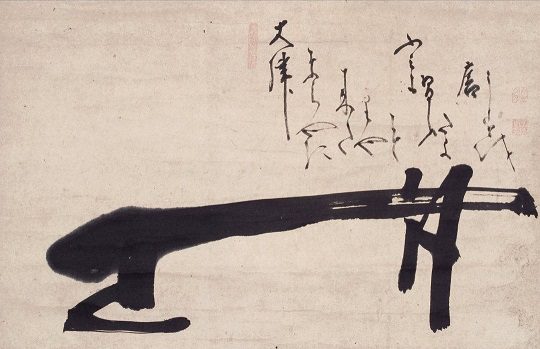Today’s Dharma Study will be “On Repentance” from The Sutra of Hui-neng.
 Here is a transcript of the chapter on Repentance, so that you may review it. Please join us, if you can, for this special Dharma Study…
Here is a transcript of the chapter on Repentance, so that you may review it. Please join us, if you can, for this special Dharma Study…
Transcript:
On Repentance Once there was a big gathering of scholars and commoners from Kuang-chou, Shao-chou, and other places to wait upon the patriarch to preach to them. Seeing this, the patriarch mounted the pulpit and delivered the following address:
In Buddhism, we should start from our essence of mind. At all times let us purify our own mind from one thought moment to another, treat the path by our own efforts, realize our own dharmakāya, realize the Buddha in our own mind, and deliver ourselves by a personal observance of shīla then your visit will not have been in vain. Since all of you have come from afar, the fact of our meeting here shows that there is a good affinity between us. Now let us sit down in the Indian fashion, and I will give you the five kinds of incense of the dharmakāya. When they had sat down, the patriarch continued:
The first is the shīla incense, which means that our mind is free from taints of misdeeds, evil, jealousy, avarice, anger, spoliation, and hatred.
The second is the samādhi incense, which means that our mind is unperturbed in all circumstances, favorable or unfavorable.
The third is the prajñā incense, which means that our mind is free from all impediments, that we constantly introspect our essence of mind with wisdom, that we refrain from doing all kinds of evil deeds, that although we do all kinds of good acts, yet we do not let our mind become attached to [the fruits of] such actions, and that we are respectful toward our superiors, considerate to our inferiors, and sympathetic to the destitute and the poor.
The fourth is the incense of liberation, which means that our mind is in such an absolutely free state that it clings to nothing and concerns itself neither with good nor evil.
The fifth is the incense of knowledge obtained on the attainment of liberation. When our mind clings to neither good nor evil we should take care not to let it dwell upon vacuity, or remain in a state of inertia. Rather should we enlarge our study and broaden our knowledge, so that we can know our own mind, understand thoroughly the principles of Buddhism, be congenial to others in our dealings with them, get rid of the idea of self and that of being, and realize that up to the time when we attain bodhi the true nature [essence of mind] is always immutable. Such, then, is the incense of knowledge obtained on the attainment of liberation. This fivefold incense fumigates us from within, and we should not look for it from without.
Now I will give you the “formless” repentance, which will expiate our sins committed in our present, past, and future lives, and purify our karmas of thought, word, and deed. Learned Audience, please follow me and repeat together what I say.
May we, disciples so and so, be always free from the taints of ignorance and delusion.
We repent of all our sins and evil deeds committed under delusion or in ignorance.
May they be expiated at once and may they never arise again.
May we be always free from the taints of arrogance and dishonesty [asatya].
We repent of all our arrogant behavior and dishonest dealings in the past.
May they be expiated at once and may they never arise again.
May we be always free from the taints of envy and jealousy.
We repent of all our sins and evil deeds committed in an envious or jealous spirit.
May they be expiated at once and may they never arise again.
Learned Audience, this is what we call formless ch’an hui [repentance]. Now what is the meaning of ch’an? Ch’an refers to the repentance of past sins. To repent of all our past sins and evil deeds committed under delusion, ignorance, arrogance, dishonesty, jealousy, or envy, and so on, so as to put an end to all of them, is called ch’an. Hui refers to that part of repentance concerning our future conduct. Having realized the nature of our transgression [we make a vow] that hereafter we will put an end to all kinds of evil committed under delusion, ignorance, arrogance, dishonesty, jealousy, or envy, and that we shall never sin again. This is hui.
On account of ignorance and delusion, common people do not realize that in repentance they have not only to feel sorry for their past sins but also to refrain from sinning in the future. Since they take no heed of their future conduct they commit new sins before the past are expiated. How can we call this repentance? Learned Audience, having repented of our sins we will take the following four all-embracing vows.
We vow to deliver an infinite number of sentient beings of our mind.
We vow to get rid of the innumerable defilements in our own mind.
We vow to learn the countless systems in dharma of our essence of mind.
We vow to attain the supreme buddhahood of our essence of mind.
Learned Audience, all of us have now declared that we vow to deliver an infinite number of sentient beings; but what does that mean? It does not mean that I, Hui-neng, am going to deliver them. And who are these sentient beings within our mind? They are the delusive mind, the deceitful mind, the evil mind, and such like minds—all these are sentient beings. Each of them has to deliver himself by means of his own essence of mind. Then the deliverance is genuine. Now, what does it mean to deliver oneself by one’s own essence of mind? It means the deliverance of the ignorant, the delusive, and the vexatious beings within our mind by means of right views. With the aid of right views and prajñā wisdom the barriers raised by these ignorant and delusive beings may be broken down; so that each of them is in a position to deliver himself by his own efforts. Let the fallacious be delivered by rightness, the deluded by enlightenment, the ignorant by wisdom, and the malevolent by benevolence. Such is genuine deliverance.
As to the vow “We vow to get rid of the innumerable evil passions in the mind,” it refers to the substitution of our unreliable and illusive thinking faculty by the prajñā wisdom of our essence of mind.
As to the vow “We vow to learn countless systems of dharmas,” there will be no true learning until we have seen face-to-face our essence of mind, and until we conform to the orthodox dharma on all occasions.
As to the vow “We vow to attain supreme buddhahood,” when we are able to bend our mind to follow the true and orthodox dharma on all occasions, and when prajñā always rises in our mind, so that we can hold aloof from enlightenment as well as from ignorance, and do away with truth as well as falsehood, then we may consider ourselves as having realized the buddha-nature, or in other words, as having attained buddhahood.
Learned Audience, we should always bear in mind that we are treading the path, for thereby strength will be added to our vows. Now, since all of us have taken these four all-embracing vows, let me teach you the formless threefold guidance. We take enlightenment as our guide, because it is the culmination of both punya [merit] and prajñā [wisdom]. We take orthodoxy [dharma] as our guide, because it is the best way to get rid of desire. We take purity as our guide, because it is the noblest quality of mankind. Hereafter, let the Enlightened One be our teacher; on no account should we accept Māra [the personification of evil] or any heretic as our guide.
This we should testify to ourselves by constantly appealing to the three gems of our essence of mind, in which, Learned Audience, I advise you to take refuge. They are:
Buddha, which stands for enlightenment
Dharma, which stands for orthodoxy
Sangha [the order], which stands for purity
From the Diamond Sutra and The Sutra of Hui-neng (Shambhala Classics) . Shambhala Publications. Kindle Edition.
